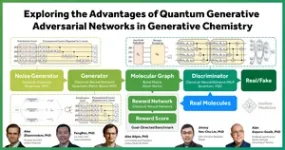(Press-News.org) HOUSTON – (May 19, 2023) – Researchers from Rice University and Baylor College of Medicine are hoping a first-of-its-kind “glyco-immune” checkpoint inhibitor could be the key to stopping bone cancer metastasis for breast cancer survivors.
Breast cancer often migrates to other organs. As many as 40% of breast cancer survivors are diagnosed with metastatic cancer, sometimes years after their initial treatment. Bone metastasis is involved in more than two-thirds of those cases, and bone metastatic lesions are known to “seed” metastatic cancer in other organs of the body.
Rice chemist Han Xiao and Baylor biologist Xiang Zhang have identified a new way to train patients’ immune systems to specifically target and kill bone metastatic cancer. Thanks to a $2.3 million Breakthrough II award from the Breast Cancer Research Program of the Department of Defense’s Congressionally Directed Medical Research Programs, they’ll be able to further test the technology and see if it warrants development for human clinical trials.
Xiao said metastatic bone cancer eats away at patients’ skeletons, leaving them prone to fractures that often require surgery.
“For bone metastasis right now, unfortunately there's no cure,” said Xiao, who joined Rice in 2017 with funding from the Cancer Prevention and Research Institute of Texas (CPRIT). “It is a terribly painful disease. Patients endure many fractures and surgeries. Better and more effective treatments are badly needed.”
The therapy Xiao and Zhang are developing is an innovative new checkpoint inhibitor, a type of immunotherapy drug that was pioneered by James Allison at the University of Texas MD Anderson Cancer Center in Houston.
Cancer often evades attack by the body’s immune system by co-opting regulatory systems that dampen immune response. Checkpoint inhibitors are drugs that block this evasion. They target immune-damping proteins on the surface of cancer cells, allowing the immune system to recognize cancer and mark it for destruction by immune T-cells.
Checkpoint inhibitors have been a game-changer for the treatment of some cancers, including some forms of breast cancer. But currently approved checkpoint inhibitors have so far proven ineffective at treating metastatic bone cancer, Xiao said.
“Bone is a really immunosuppressive environment,” he said. “T-cell proliferation is lower, and it is very hard to stimulate the T-cells. That's why we needed to find a marker, an immune checkpoint marker, that was specific to the bone.”
Unlike other checkpoint inhibitors, which target immune-suppressing proteins, Xiao and Zhang’s therapy targets a specific glycoprotein, a molecule that’s part protein and part sugar.
Glycoprotein conjugates are abundant in nature, and they are one of Xiao’s specialties. A chemical biologist, his research group focuses on both cancer immunology and glycobiology to understand the interface between cancer and immunity.
Xiao and Zhang previously identified the glycoprotein as a glyco-immune checkpoint target that was prevalent in metastatic bone cancer cells. They developed a drug that binds with the glycoprotein, and it proved remarkably effective in preliminary tests. In the first animal tests on a small sample of rodents, for example, the treatment eradicated cancer from some animals.
“Our study will, for the first time, reveal how a blockade of the glyco-immune checkpoint in bone may impede bone metastasis and subsequent multiorgan metastases,” said Zhang, interim director of Baylor’s Lester and Sue Smith Breast Center and a member of the Dan L Duncan Comprehensive Cancer Center.
Xiao is a Norman Hackerman-Welch Young Investigator, a CPRIT Scholar in Cancer Research and an assistant professor of chemistry, bioengineering and biosciences at Rice. Zhang is a William T. Butler Endowed Chair for Distinguished Faculty at Baylor, a McNair Scholar and a professor of molecular and cellular biology.
-30-
Image downloads:
https://news-network.rice.edu/news/files/2023/05/0515_GLYCO-Fit1-9-lg.jpg
CAPTION: From left, Baylor College of Medicine biologist Xiang Zhang and Rice University chemist Han Xiao have received $2.3 million from the Department of Defense to continue development of a promising new “glyco-immune” checkpoint inhibitor, a drug that would train the immune systems of breast cancer survivors to target and kill metastatic bone cancer. (Photo by Jeff Fitlow/Rice University)
Related stories:
Antibody with engineered peptide targets bone metastasis – Jan. 24, 2022
https://news.rice.edu/news/2022/antibody-engineered-peptide-targets-bone-metastasis
Rice, Baylor win defense grant to advance metastasis study – Aug. 19, 2021
https://news2.rice.edu/2021/08/19/rice-baylor-win-defense-grant-to-advance-metastasis-study/
Drug doubles down on bone cancer, metastasis – June 23, 2021
https://news.rice.edu/news/2021/drug-doubles-down-bone-cancer-metastasis
Rice awarded grant to recruit Stanford cancer researcher – March 27, 2017
https://news2.rice.edu/2017/03/27/rice-awarded-grant-to-recruit-stanford-cancer-researcher/
This release can be found online at news.rice.edu.
Follow Rice News and Media Relations via Twitter @RiceUNews.
Located on a 300-acre forested campus in Houston, Rice University is consistently ranked among the nation’s top 20 universities by U.S. News & World Report. Rice has highly respected schools of Architecture, Business, Continuing Studies, Engineering, Humanities, Music, Natural Sciences and Social Sciences and is home to the Baker Institute for Public Policy. With 4,240 undergraduates and 3,972 graduate students, Rice’s undergraduate student-to-faculty ratio is just under 6-to-1. Its residential college system builds close-knit communities and lifelong friendships, just one reason why Rice is ranked No. 1 for lots of race/class interaction and No. 4 for quality of life by the Princeton Review. Rice is also rated as a best value among private universities by Kiplinger’s Personal Finance.
END
Researchers at Chalmers’ Division of Applied Acoustics have conducted a laboratory study in which test subjects took concentration tests while being exposed to background traffic noise. The subjects were asked to look at a computer screen and react to certain letters, then to assess their perceived workload afterwards. The study shows that the subjects had significantly poorer results on the performance test, and also felt that the task was more difficult to carry out, with traffic noise in the background.
“What is unique about our study is that we were able to demonstrate a decline in performance at noise levels as low as 40 dB, which ...
The Johanna Spyri and Heidi archives in Zurich have been added to UNESCO's Memory of the World International Register. The decision by the Executive Board of UNESCO acknowledges the collections' universal importance. The University of Zurich will be working with both institutions to promote the academic study of the collections.
Heidi is important to Switzerland’s cultural heritage and has influenced art and popular culture around the world for more than a century. The documentary heritage ...
Researchers have observed the X-ray emission of the most luminous quasar seen in the last 9 billion years of cosmic history, known as SMSS J114447.77-430859.3, or J1144 for short. The new perspective sheds light on the inner workings of quasars and how they interact with their environment. The research is published in Monthly Notices of the Royal Astronomical Society.
Hosted by a galaxy 9.6 billion light years away from the Earth, between the constellations of Centaurus and Hydra, J1144 is extremely powerful, shining 100,000 billion times brighter ...
Sounds that we hear around us are defined physically by their frequency and amplitude. But for us, sounds have a meaning beyond those parameters: we may perceive them as pleasant or unpleasant, ominous or reassuring, and interesting and rich in information, or just noise.
One aspect that affects the emotional ‘valence’ of sounds – that is, whether we perceive them as positive, neutral, or negative – is where they come from. Most people rate looming sounds, which move towards them, as more unpleasant, potent, arousing, and intense than receding sounds, ...
Burlington, VT, USA, 19 May 2023 – Limited accuracy and transparency of national greenhouse gas emission inventories are curbing climate action, especially in the agriculture and land use sector.
Inconsistent and inadequate reporting by low-and-middle-income countries (LMICs), uncertainties in reported data, and a lack of robust activity data and locally specific emission factors have been found to curb effective policy action. GHG inventories are the foundation for accounting and tracking progress toward mitigation goals and decision-makers must have access to reliable, legible, and consistent data to make informed decisions.
A review of UNFCCC country-reported agricultural ...
Sensors that detect changes in atmospheric pressure due to ground shaking can also obtain data about large earthquakes and explosions that exceed the upper limit of many seismometers, according to new research.
The sensors, which detect inaudible infrasounds carried through the air, could improve tsunami warnings and other emergency responses while also lowering costs.
Research by University of Alaska Fairbanks Geophysical Institute scientists shows that infrasound sensors can improve magnitude determinations. An initial ...
PHOENIX (May 18, 2023) – Today during the SCAI 2023 Scientific Sessions in Phoenix, SCAI President Sunil V. Rao, MD, FSCAI recognized outstanding SCAI members for their ongoing contributions to the field of interventional cardiology, the Society, and patient care. Honorees span a broad spectrum of practitioners, all of whom have demonstrated a commitment to excellence throughout their careers, helping to shape the Society as well as the lives of patients, mentees, and colleagues.
The following awards were presented:
Mason Sones Award for Distinguished Service
J. ...
Women’s health experts from the Raquel and Jaime Gilinski Department of Obstetrics, Gynecology and Reproductive Science at the Icahn School of Medicine at Mount Sinai will present new research and surgical techniques at the 2023 American College of Obstetricians and Gynecologists (ACOG) Annual Clinical and Scientific Meeting in Baltimore, Md. from May 19–21. Please let me know if you would like to coordinate an interview about their forthcoming work. These obstetricians and gynecologists are also available to comment on breaking news and other trending topics about prenatal care and women’s ...
Physicist Jin Hu has been awarded a second Faculty Early Career Development (CAREER) award, this time from the National Science Foundation. The new award of $579,527 comes two years after Hu received a $750,000 CAREER Award from the U.S. Department of Energy.
NSF and DOE CAREER awards are considered the most competitive and prestigious awards to honor faculty members in the early stages of their careers. The awards support research and education activities. It is rare for an investigator to receive two CAREER awards.
Hu, an assistant professor of physics in the Fulbright College of Arts and Sciences, leads the Quantum Materials group at ...
Extreme environments in several critical industries – aerospace, energy, transportation and defense – require sensors to measure and monitor numerous factors under harsh conditions to ensure human safety and integrity of mechanical systems.
In the petrochemical industry, for example, pipeline pressures must be monitored at climates ranging from hot desert heat to near arctic cold. Various nuclear reactors operate at a range of 300-1000 degrees Celsius, while deep geothermal wells hold temperatures up to 600 degrees Celsius.
Now a team of University of Houston researchers has developed ...






